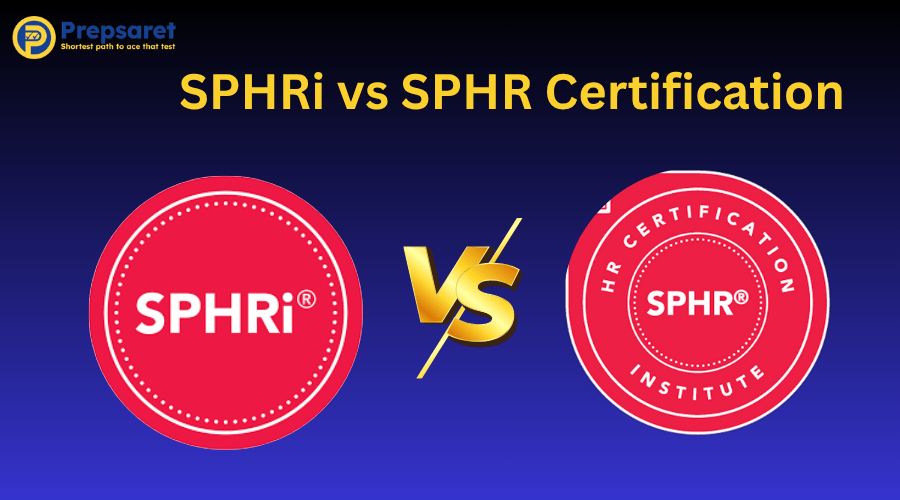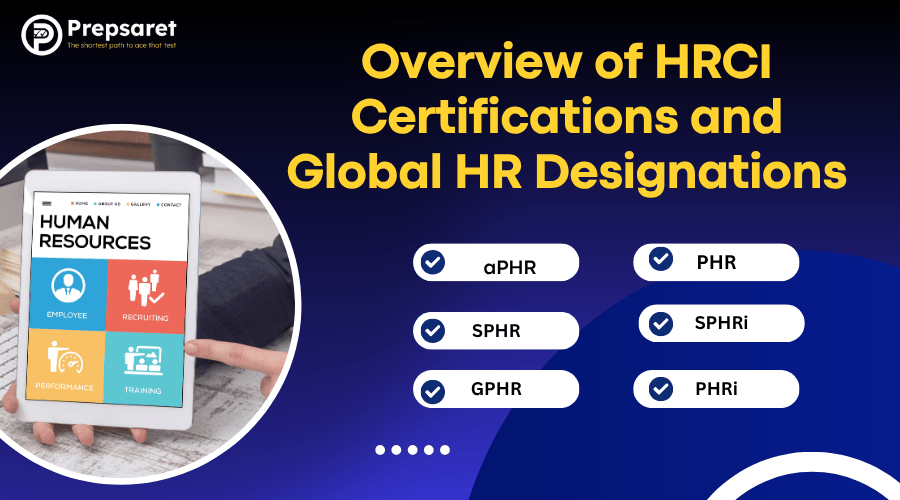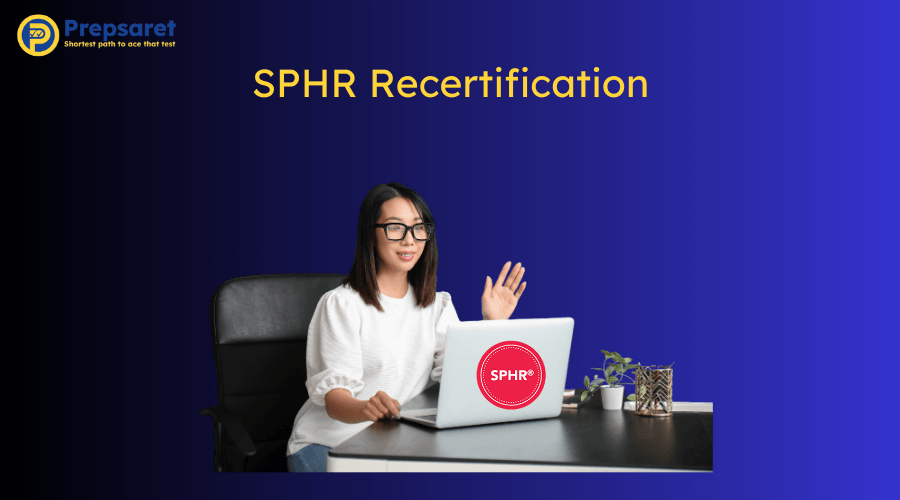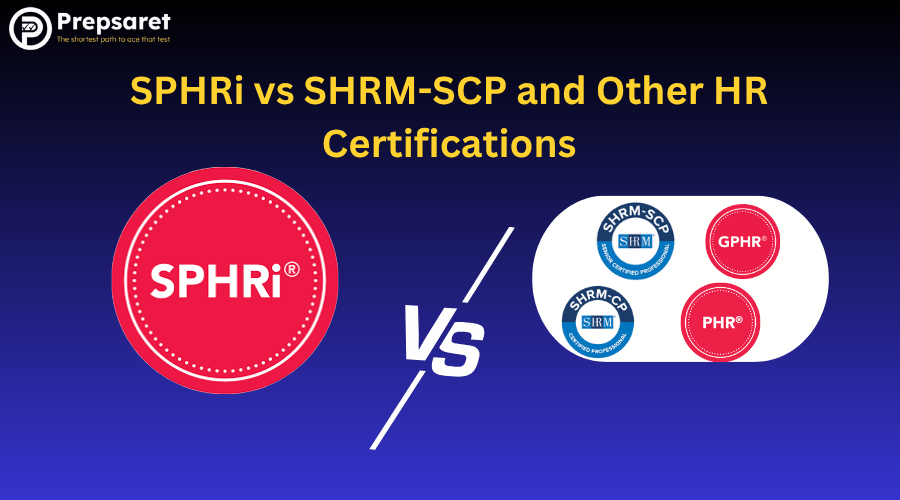Choosing between SPHRi vs SPHR can shape your entire HR career trajectory. Both HRCI certifications validate senior-level human resources credentialing, but they serve different professional contexts.
The difference between SPHRi and SPHR lies primarily in geographic focus, one targets global HR leaders while the other emphasizes U.S.-based expertise. Understanding what’s the difference between SPHRi and SPHR certification helps you align your credentials with career goals.
At Prepsaret, we provide comprehensive prep materials to help you ace whichever exam matches your ambitions.
Overview of HRCI Certifications and Global HR Designations
The HR Certification Institute (HRCI) stands as a premier credentialing body offering multiple HR professional certification options. While debates like HRCI vs SHRM continue among professionals, HRCI maintains a distinct reputation for rigorous, knowledge-based assessments.
The HRCI exam overview reveals a tiered certification structure:
- aPHR – Entry-level for those beginning HR careers
- PHR – Professional-level for operational HR roles
- SPHR – Senior-level for strategic U.S.-focused positions
- PHRi – Professional-level with international HR certification emphasis
- SPHRi – Senior-level global HR certification
- GPHR – Specialized global HR management credential
Each designation within this senior professional in human resources framework addresses specific career stages and geographic scopes. The international variants (PHRi, SPHRi, GPHR) incorporate cross-border employment law, global talent management, and multinational organizational dynamics, essential competencies for today’s borderless workforce.
SPHRi Certification
The SPHRi certification represents HRCI’s answer to globalization’s impact on human resources. Unlike domestic certifications, the SPHRi exam content emphasizes international labor standards, cross-cultural management, and global compliance frameworks.
SPHRi Course Outline and Focus Areas
The SPHRi course outline covers five functional areas:
- Leadership and Strategy (33%) – Aligning HR strategy with international business goals
- Workforce Planning and Talent Acquisition (17%) – Global sourcing and workforce optimization
- Talent Management (23%) – Developing, retaining, and engaging diverse global talent
- Total Rewards (17%) – Managing international compensation and benefits structures
- HR Information Management, Safety, and Security (10%) – Ensuring data integrity, compliance, and workplace safety worldwide
SPHRi Requirements
To qualify for SPHRi requirements, candidates must meet specific education and experience combinations:
- Bachelor’s degree + 4 years of strategic HR experience
- Master’s degree + 3 years of strategic HR experience
- Less than a bachelor’s degree + 7 years of strategic HR experience
At least 2 years of this experience should involve international HR responsibilities.
SPHRi Exam Structure
The SPHRi exam structure includes 140 multiple-choice questions administered over 3 hours. Questions test application, analysis, and synthesis rather than simple recall, evaluating how you’d handle real-world global HR scenarios.
Try Out: SPHRi Free Questions
SPHR Certification
The SPHR certification validates senior-level HR expertise specifically within U.S. employment contexts. While equally rigorous, it concentrates on domestic labor law, federal compliance requirements, and American business practices.
SPHR Eligibility Requirements
SPHR eligibility mirrors SPHRi’s experience thresholds:
- Bachelor’s degree + 4 years of strategic HR experience
- Master’s degree + 3 years of strategic HR experience
- Less than a bachelor’s degree + 7 years of strategic HR experience
All experience must demonstrate policy-making responsibility within U.S.-based organizations.
SPHR Exam Difficulty
The SPHR exam difficulty lies in its focus on strategic judgment and policy application. Candidates must not only know HR principles but also apply them in complex business scenarios requiring leadership-level decision-making.
How Many Questions Are on the SPHR Exam?
Wondering how many questions on the SPHR exam? The answer is 140 scored questions plus 25 pretest items (not counted toward your score). You’ll have 3 hours to complete the assessment, with questions distributed across these domains:
- Leadership & Strategy (40%)
- Talent Planning & Acquisition (16%)
- Learning & Development (11%)
- Total Rewards (12%)
- Employee & Labor Relations (21%)
Read More Here: SPHR Exam Domains
SPHR Exam Preparation Strategies
Effective SPHR exam preparation requires more than memorization. Consider these approaches:
- Study U.S.-specific labor laws like FMLA, ADA, FLSA, and NLRA
- Practice scenario-based questions that test judgment
- Review strategic HR planning methodologies
- Understand metrics and analytics for HR decision-making
Prepsaret offers targeted practice exams that mirror actual SPHR question formats, helping you identify knowledge gaps before test day.
Check this out: Try SPHR Free Questions
SPHRi vs SPHR Eligibility Requirements
When comparing SPHRi vs SPHR eligibility requirements, the baseline education and experience standards appear identical. Both demand senior-level strategic experience, but the nature of that experience differs.
Key distinctions:
| Creteria | SPHRI | SPHR |
| Experience Focus | International/cross-border HR | U.S.-based strategic HR |
| International Requirements | Minimum 2 years global HR work | Not required |
| Geographic Scope | Multi-country operations | Domestic Organizations |
Neither certification requires specific coursework or degrees in HR, relevant experience and passing the exam suffice. However, SPHRi candidates benefit from exposure to international employment regulations, while SPHR candidates need deep familiarity with U.S. federal and state laws.
SPHRi vs SPHR Exam Cost and Format
Understanding SPHRi vs SPHR exam cost and format helps with budgeting and logistics planning.
SPHRi and SPHR Exam Registration Fees
Current PHRi exam fees and related HRCI certification costs stand at:
- SPHR: $495 for HRCI members, $595 for non-members
- SPHRi: $495 for HRCI members, $595 for non-members
Both exams offer similar pricing, though membership in HRCI ($95 annually) provides the discount plus access to study resources.
Testing Format and Question Breakdown for SPHR and SPHRi
Both assessments follow identical structures:
- Computer-based testing at PSI/Prometric centers worldwide
- 140 scored questions plus 25 pretest items
- 3-hour time limit
- Results available immediately upon completion (pass/fail only)
The SPHRi exam structure accommodates international test-takers with centers across five continents, while SPHR primarily serves North American locations.
Check Out: SPHR Exam Format
Recertification Costs for SPHRi and SPHR
Both credentials require recertification every 3 years through 60 professional development credits or retesting. This ensures your knowledge remains current as HR practices evolve.
Check Out: SPHR Exam Cost
SPHRi vs SPHR Difficulty Level and Exam Content
Many professionals wonder about SPHRi vs SPHR difficulty level, which exam presents greater challenges?
SPHRi and SPHR Exam Difficulty Level
The SPHR exam difficulty and SPHRi’s challenge level are roughly equivalent, though they test different knowledge domains. Both require:
- Strategic thinking rather than operational task knowledge
- Application skills for real-world problem-solving
- Analytical abilities to interpret complex scenarios
- Synthesis capacity to integrate multiple HR functions
SPHRi vs SPHR Content Distinctions
The SPHRi exam content emphasizes:
- International labor standards (ILO conventions)
- Cross-cultural communication and management
- Global mobility and expatriate management
- Multi-jurisdictional compliance
- Currency fluctuations impacting compensation
SPHR content focuses on:
- U.S. employment law depth (EEOC, DOL, OSHA regulations)
- American workplace culture norms
- Domestic benefits administration
- U.S.-specific collective bargaining
- Federal compliance reporting
Estimated Pass Rates and Study Time for Both Exams
While HRCI doesn’t publish exact pass rates, industry estimates suggest both exams maintain 60-65% first-attempt pass rates. Most successful candidates invest 80-120 hours of study time over 2-4 months.
Prepsaret’s practice tests help you gauge readiness by simulating actual exam conditions with questions that match official difficulty levels.
Is SPHRi Recognized in the US?
The short answer is yes, SPHRi carries full recognition in American markets, though with some considerations.
Recognition of SPHRi in U.S. Markets
U.S. employers understand that SPHRi holders possess senior HR competencies. However, when comparing SPHRi or SPHR for global HR roles in domestic contexts, preferences vary:
- Multinational corporations often prefer SPHRi for positions managing international teams
- Domestic-only companies may favor SPHR’s U.S.-focused expertise
- Global consulting firms value SPHRi’s cross-border knowledge
Career and Professional Benefits of SPHRi Certification
SPHRi shines in international career mobility. The certification signals competency across diverse legal frameworks and cultural contexts, invaluable when relocating or managing distributed global teams.
SPHR, while respected, primarily demonstrates mastery of American HR practices. International employers may question its relevance outside U.S. contexts.
HR Certification Career Benefits
Both credentials enhance HR certification career benefits including:
- Increased credibility with executive leadership
- Higher earning potential (detailed in the next section)
- Expanded career opportunities
- Professional network access through HRCI membership
- Recognition of strategic HR capabilities
SPHRi vs SPHR Salary Comparison and Career Outcomes
When considering professional growth, financial returns play a major role. The SPHR vs SPHRi salary comparison highlights how compensation varies by region and career level.
SPHRi and SPHR Earning Trends
Recent industry data shows clear earning trends:
- SPHR holders in the U.S. earn median salaries of $105,000-$130,000
- SPHRi holders globally report median earnings of $95,000-$125,000 (adjusted for purchasing power parity)
- Senior HR leaders with either credential in major metros command $140,000-$180,000+
Geographic Difference in Compensation
Compensation differs significantly based on location:
- U.S. coastal markets favor SPHR for purely domestic roles
- Asian and European markets increasingly recognize SPHRi
- Middle Eastern organizations often prefer international certifications like SPHRi
- Latin American companies value both equally, depending on parent company location
Career Advancement Opportunities with SPHR and SPHRi
This HR certification comparison shows that both credentials open doors to advanced leadership roles such as:
- VP of Human Resources roles
- Global HR Director positions
- HR Business Partner leadership
- Chief Human Resources Officer (CHRO) opportunities
The choice between certifications shouldn’t rest solely on salary, career aspirations and work environment matter more.
Find Out: Is SPHR Certification Worth It?
SPHRi vs SHRM-SCP and Other HR Certifications
Beyond SPHRi vs SPHR, understanding how these compare to other credentials clarifies the certification landscape.
SPHRi vs SHRM-SCP
The SPHRi vs SHRM-SCP debate contrasts HRCI and SHRM approaches:
- SHRM-SCP emphasizes competency-based assessment and organizational leadership
- SPHRi tests knowledge application within global contexts
- SHRM-SCP certification holders may find broader U.S. recognition due to SHRM’s larger membership
- SPHRi provides clearer international positioning
Both represent senior-level credentials with comparable respect in the field.
SPHRi vs GPHR
SPHRi vs GPHR comparisons reveal overlapping territory. GPHR (Global Professional in Human Resources) specifically targets HR practitioners who spend the majority of their time on cross-border HR activities.
SPHRi serves senior leaders who integrate global considerations into strategic planning, they may not work exclusively on international matters but must understand global implications.
SPHRi vs PHRi vs SPHR
The SPHRi vs PHRi vs SPHR distinction breaks down by seniority and geography:
- PHRi = Professional-level, international focus (operational expertise)
- SPHRi = Senior-level, international focus (strategic leadership)
- SPHR = Senior-level, U.S. focus (strategic leadership)
Choose based on your experience level and where you’ll practice HR.
aPHR vs PHR
While tangential, the aPHR vs PHR comparison helps those earlier in their careers:
- aPHR suits those entering HR or with less than 2 years’ experience
- PHR requires professional-level operational HR experience
Both serve as stepping stones toward senior certifications like SPHR or SPHRi.
How to Choose Between SPHRi and SPHR
Understanding how to choose between SPHRi and SPHR requires honest assessment of your career context and aspirations.
Decision Framework
Ask yourself these questions:
- Where do you currently work?
- If in a multinational organization managing cross-border teams → SPHRi
- If in a U.S.-focused company with domestic operations → SPHR
- Where do you want to work in 5-10 years?
- Planning international relocation or global roles → SPHRi
- Staying within U.S. markets → SPHR
- What does your experience include?
- Substantial international HR exposure → SPHRi
- Deep U.S. employment law and compliance work → SPHR
- What does your industry value?
- Tech, consulting, manufacturing with global footprints → SPHRi
- Healthcare, government, domestic retail → SPHR
SPHRi vs SPHR: Which Is Better for International HR Professionals?
If you’re asking which is better SPHRi or SPHR for international HR professionals, the SPHRi is ideal for global roles. It validates cross-border HR expertise, multi-jurisdictional compliance, and international workforce management skills.
SPHRi vs SPHR: Which One Should I Take?
When deciding SPHRi vs SPHR which one should I take, consider these points:
Choose SPHRi if you:
- Work for a multinational corporation
- Manage employees across multiple countries
- Plan to work abroad or already do
- Handle expatriate assignments or global mobility
- Want maximum international career flexibility
Choose SPHR if you:
- Work primarily with U.S.-based employees
- Need deep expertise in American employment law
- Plan to stay within domestic HR markets
- Work in industries with limited international presence
- Want recognition in traditional U.S. HR circles
Can You Hold Both SPHRi and SPHR Certifications?
Yes. Some professionals maintain both SPHRi and SPHR credentials to showcase comprehensive HR mastery. This requires passing both exams and completing separate recertification cycles (120 credits total every three years). However, most find one certification sufficient for their goals.
What’s the Difference Between SPHRi and SPHR Certification?
Ultimately, the difference between SPHRi and SPHR certification lies in their focus and scope. The SPHR validates deep expertise in U.S. HR laws and practices, while the SPHRi demonstrates mastery of global HR strategy across borders.
Your choice should align with where you work, and where you aspire to grow as an HR leader.
Find Out: Most recognized HR certifications
SPHRi vs SPHR: FAQs
No. SPHRi requires 4-7 years of senior-level strategic HR experience depending on education, with at least 2 years involving international responsibilities. SPHR receives some international recognition, but it primarily demonstrates U.S. HR expertise. For maximum global portability, SPHRi or GPHR offer stronger positioning. The primary difference lies in geographic focus: SPHRi emphasizes global HR management across multiple countries, while SPHR concentrates on strategic HR within U.S. employment contexts. Respect varies by context. In the U.S., SPHR and SHRM-SCP hold strong reputations. Internationally, SPHRi and GPHR carry weight. All HRCI and SHRM senior credentials command respect. SPHRi stands for Senior Professional in Human Resources – International. It's HRCI's senior-level certification for HR leaders managing global workforces and cross-border operations. SPHRi benefits include global career mobility, recognition of international HR expertise, increased earning potential, leadership credibility, and strategic positioning for multinational organizations. HRCI doesn't publish official pass rates, but industry estimates suggest 60-65% of candidates pass on their first attempt. Thorough preparation significantly improves success odds. SPHR is considerably more challenging than PHR. It tests strategic decision-making and policy creation rather than operational implementation. SPHR assumes you already know PHR-level content and builds upon it with senior leadership competencies. Can I Take SPHRi Without HR Experience?
Is SPHR Recognized Globally?
What Is the Difference Between SPHRi and SPHR?
What Is the Most Respected HR Certification?
What Does SPHRi Mean?
What Are the Benefits of SPHRi?
What Is the Pass Rate for the SPHRi Exam?
How Much Harder Is SPHR than PHR?
Conclusion: Making the Right Choice for Your HR Career
Choosing between SPHRi vs SPHR comes down to your career goals and work environment. Both certifications validate senior-level HR expertise, with one emphasizing global strategy and the other focusing on U.S. compliance and leadership.
Evaluate your long-term objectives carefully, and prepare confidently with Prepsaret, which offers targeted practice materials that mirror real exam conditions for maximum success.





